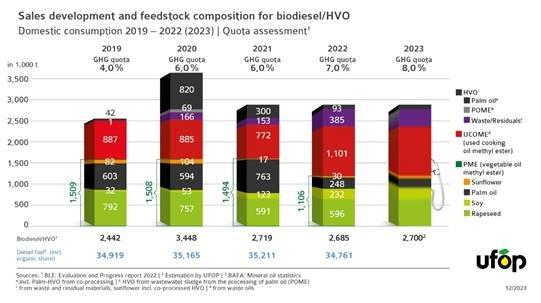At around 1.6 million tonnes, the share of biofuels from waste oils and residues that were counted towards the GHG quota obligation was around 60 per cent of domestic consumption. At 0.6 million tonnes, the share of biofuel from rapeseed oil remained unchanged compared to 2021, while the share of biofuels from palm oil fell from 0.76 million tonnes to around 0.25 million tonnes. Total sales for quota crediting remained virtually unchanged at around 2.7 million tonnes, with the quota obligation increasing from 6 to 7 per cent. UFOP attributes this development to the different emission savings of the raw materials used.
The BLE report shows a GHG reduction of around 91 per cent for biofuels from waste and 81 per cent for rapeseed oil. Another reason is the legal regulation that, from 2023, biofuels from palm oil can no longer be counted towards the national GHG quota obligation. The displacement effect of waste oil-based biofuels in turn means that biofuel quantities produced in Germany from rapeseed oil have to be exported.Germany exported around 2.34 million tonnes in 2022 (2021: 2.10 million tonnes) and imported 1.34 million tonnes (2021: 1.04 million tonnes). For the 2023 quota year, UFOP expects sales to remain unchanged at 2.7 million tonnes with an increased GHG reduction commitment of 8 per cent.
With a view to the EU Commission’s Union database created in January 2024, UFOP expects similar transparent reporting for all member states. In contrast to the national database "Nabisy", all companies in the supply chain must register here, starting at the level of the collection trade or the collector of waste oils. This process is currently taking place and poses major challenges for the companies affected for the first time, especially as the EU Commission has commissioned the creation of the database and training as a service. It is incomprehensible that the EU Commission is not carrying out these sovereign tasks itself.UFOP is therefore calling for the BLE database Nabisy to be retained at the same time.
The BLE Report 2022 (German) is available at:
https://www.ble.de/DE/Themen/Klima-Energie/Nachhaltige-Biomasseherstellung/Informationsmaterial/informationsmaterial_node.html
The Union for the Promotion of Oil and Protein Plants e. V. (UFOP) represents the political interests of companies, associations and institutions involved in the production, processing and marketing of domestic oil and protein plants in national and international bodies. UFOP supports research to optimise agricultural production and for the development of new recycling opportunities in the food, non-food and feed sectors. UFOP public relations aim to promote the marketing of domestic oil and protein plant end products.
UFOP – Union zur Förderung von Oel- und Proteinpflanzen e.V.
Claire-Waldoff-Str. 7
10117 Berlin
Telefon: +49 (30) 2359799-40
Telefax: +49 (30) 2359799-99
http://www.ufop.de
UFOP e. V.
Telefon: +49 (30) 31904-215
Fax: +49 (30) 31904-485
E-Mail: d.bockey@ufop.de
![]()
